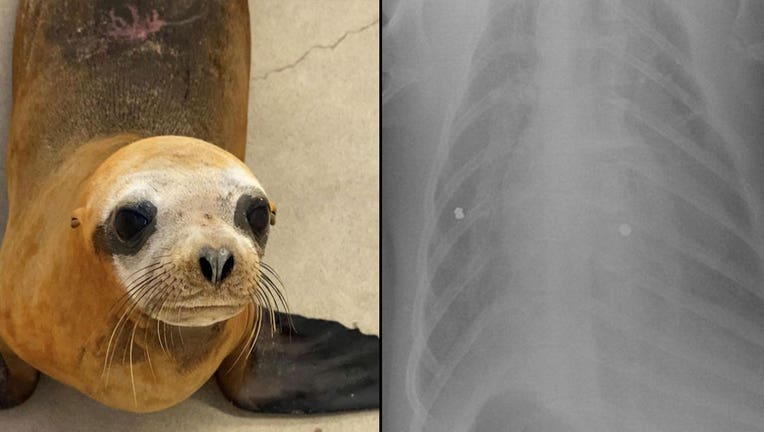Sea lion shot with pellet gun forced to be humanely euthanized due to injuries

NEWPORT BEACH, Calif. - A sea lion who was shot with a pellet gun and found in distress in Newport Beach in December was humanely euthanized due to the extent of its injuries.
On Monday, December 16, employees of the Pacific Marine Mammal Center (PMMC) rescued a female California sea lion in distress from the Wedge in Newport Beach after it was reported by Newport Beach Animal Control.
Veterinarians observed that the sea lion had two distinct wounds, one of which was a draining abscess on her dorsal back causing her pain and discomfort and limiting her ability to move normally.
They decided to conduct radiographs to better understand the extent of the animal's injury and saw what appeared to be two bullet fragments, likely from a pellet rifle, PMMC said in a press release.
The one and a half year old sea lion yearling, named Mandalorian by its rescuers, was carefully monitored throughout the next week, and despite treatment, her health continued to decline.
At that point, the rescue organization made the decision to humanely euthanize the animal on December 22.
After the sea lion was euthanized, a necropsy was performed that revealed one of the bullets had struck the animal between the rib and adjacent vertebrae. PMMC said that the entry wound most likely became infected, leading to severe muscle necrosis around the impact site and an accumulation of fluid in the chest cavity. The second gunshot was lodged in the musculature between the ribs.
The pellet bullets were recovered and will be sent to the National Oceanic and Atmospheric Administration National Marine Fisheries Service Office of Law Enforcement (NOAA NMFS OLE) for further investigation, PMMC said.
"Unfortunately, what we saw is taking place up and down the Pacific Coast. These are disgusting and intentional acts, many of which are pre-meditated. We know there are many out there that feel like they are competing with the sea lions for the same resources. However, there's a pathway for us to cohabitate with these precious marine mammals, and shooting them is not the way," said Peter Chang, CEO at PMMC.

